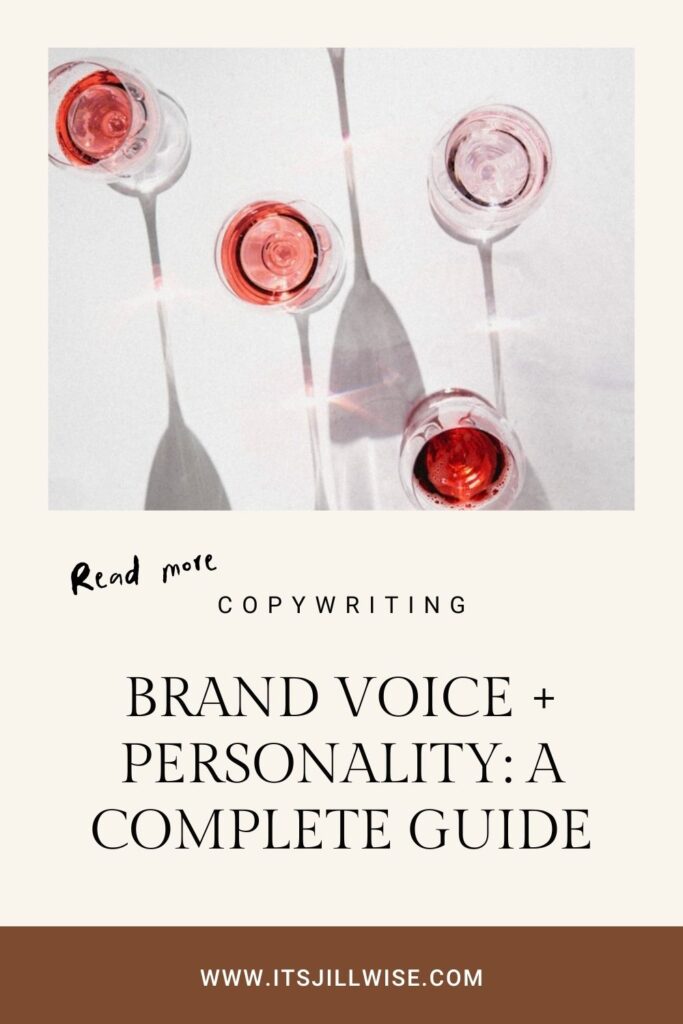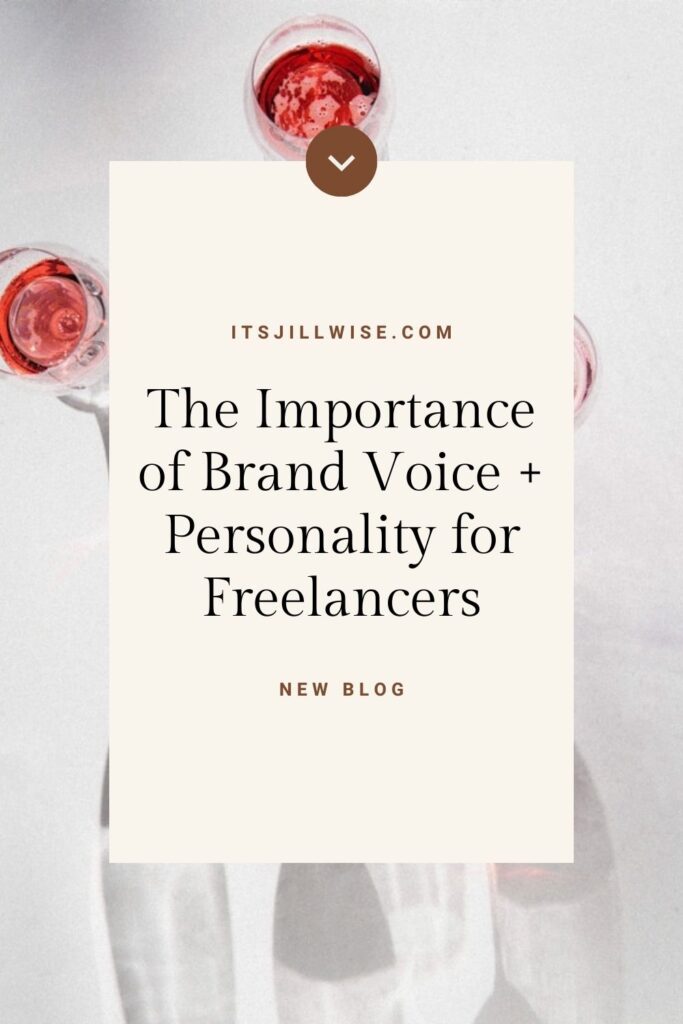What is brand personality and brand voice?
Marketers love to throw around terms like brand personality and brand voice. We often love to complicate these terms as well, but I can promise you that the jargon stops here. I’ve worked as a brand and marketing strategist for years, and have helped multiple businesses grow their online presence through a stand-out brand personality and brand voice. Not only with done-for-you clients in the studio, but coaching and consulting clients through my mastermind program. This post is a complete overview of what brand personality and brand voice really mean, and why they matter.
I also explain a bit about how you can develop your brand personality and voice for your business. Because while yes, it’s typically easier to work with a brand messaging strategist or personal brand consultant to develop your messaging, I get that many business owners and solopreneurs are figuring this out on their own first. I’ve been there! So you can expect some quick tips to start too.
What is brand personality?
Your brand personality is everything that your brand acts like. If your business were a living, breathing human, what would they talk like? Walk like? Would they have quirks or recognizable mannerisms? Memorable traits? That’s your brand personality. I like to think of this brand personality as separate from you, the business owner. Even if you’re a personal brand, you deserve to have that boundary. And by drawing this line in the sand, you can start to set better boundaries in your business.
I also find that the distinction also helps business owners “show up” online. It’s like we’re more comfortable putting on this persona or showing up consistently as some kind of alter ego… It’s us, but with more confidence. It sounds weird, but I’ve seen it work for so many people. Especially those building personal brands, but who are struggling to share any kind of content for their business services online.
Why does brand personality matter though?
It’s important to have a distinct brand personality if you want to attract inbound leads. This is actually a crucial component of a functioning sales pipeline. It’s how you’ll stand out from the crowd of other service providers, freelancers, and solopreneurs offering similar services to you. Even business is human. There’s human beings on the other side of the screen, and if two businesses are equal in every other way, the client is going to choose the one they feel most connected to. We can foster that connection with a memorable and relatable brand personality.
Think of it like this: We all have different tastes. The big idea is to attract those with similar tastes to you, and repel the ones that aren’t a good fit. Like wine! Not every wine is for everyone. Not every person is for everyone. And not every brand is for everyone… That’s okay.

What is brand voice?
Before you can find your brand voice, you first need to understand what a brand voice actually is. You may have heard marketers tossing this term around and are a little curious, or you already know that you need to pay attention to it, but don’t know where to start.
“Find your brand voice,” they say… Copywriters especially like to talk about this, and claim that they can help you find your voice then write in that same voice. But what does that actually mean?
A brand voice is the way a business communicates with its audience. It’s a component of a business’ personality crafted from a strong understanding of the collective values, unique selling proposition, and ideal client avatar. A brand voice is the words you choose. The emotions you convey through your tone. The phrases that are off limits and used commonly within your company culture. It’s everything down to the nitty gritty of your spelling and punctuation. All of these details shape the perception people have of your business as a whole.
The importance of brand voice
Developing a consistent brand voice sets the stage for meaningful connections—trusting relationships with your target clients.
When you start to think of your business as a entity separate from yourself (this is especially important for solopreneurs and personal brands!), then you can give your business it’s own brand voice. This voice is part of the personality that people will recognize as your business. It’s this personality that allows for connections, should be memorable, and attracts dream clients that are drawn to the messaging and vibe carefully constructed to bring them in. The brand voice focuses on how you speak.
Your brand voice should consider things like:
- How do you share client wins?
- How do you address pain points with empathy?
- What type of language do you use?
- What words or phrases are common?
- And so much more…
Brand personality framework
Over years of working with small and large businesses, solopreneurs, freelancers, and personal brands, I’ve developed a framework to create an engaging and attractive brand personality. My ultimate goal is to help private clients and students make more sales online, and grow their businesses. To do that, we need to be super strategic when developing a brand personality so their ideal client avatar absolutely loves the vibe. When done incorrectly, the brand personality and brand voice might actually turn off the people you want to connect with. The goal is to repel the bad fits and attract the right ones.
I can’t give away all my secrets (that’s why you work with me or enroll in my courses!), but here’s a few to give you an idea…
Core values shape a brand’s personality
We always begin with the core values when developing a brand personality and voice. These are a great starting point because they show what the business is all about at it’s core. For example, a business that states “innovation” as one of it’s core values will likely speak differently than one that notes something like “traditions.” Think of your own core values as an individual compared to those of a partner, close friend, or family member. Your values impact your personality traits and the same is true in branding.
The ideal client avatar will connect with your brand personality
Of course the brand personality is a reflection of the business, but the ideal client avatar needs to be considered as well. Are there specific traits they will feel particularly drawn to and should be highlighted? For example, if the dream client has tried to get help for their specific challenge in the past, but was let down, they might be looking for a business that appears professional and reliable, so they can start to trust with little friction.
Often, the business owner or founder’s personality shines
Even though I suggest to all clients and students that they think of their businesses as separate from themselves, there’s typically still bits of the owner woven throughout the brand personality. What good sides of them should be highlighted? What traits should the business run with and what boundaries can be drawn? This is true regardless of whether you’ve positioned your business as its own entity, or are going with a personal brand.
Communication standards are a part of brand personality
This is arguably getting more into the realm of brand voice, but each business follows a different set of communication standards and these should be considered when creating a brand voice and personality. Where and how you speak with prospects and clients. The type of language you use, formatting rules, and the topics you publicly discuss.
There are plenty of other factors to consider when developing a brand voice, but these are some of the most important to begin with. I walk private clients and students through a series of exercises to find their unique brand voice.

How to find your brand voice
A quick note: I prefer thinking of brand voice as something you create, rather than find. Sure, elements of it might already be floating in your head waiting for you to notice them, but create is much more active and strategic. You need to carefully select each component of your brand voice.
To get started creating your brand voice, ask yourself the following questions:
What are the core values of your business? As mentioned about, your brand personality should be rooted in your values, mission, and vision.
How do you want customers to perceive your business? If you’re already operating, ask your audience how they describe your brand, so you can learn what’s translating and what’s missing the mark.
If your business were a person, what would they act like? What would they talk like? What would they do?
Write down all the descriptors that come to mind when considering the above questions. These are the beginnings of your goals for your brand voice. Is your voice funny and quick? Or thoughtful and creative-minded? Do you use slang or industry jargon? Or stick to conversational, colloquial language?
The tone of your brand voice
Another aspect to consider: tone. Tone is the emotional inflection of your voice. Your brand needs to empathize with your audience in order to authentically connect. In what instances are specific emotions appropriate? For example, you don’t want to crack a joke at your audience’s expense unless they find that kind of humour funny.
These are just the basics to consider when crafting your brand voice. I walk my clients and students through these questions plus a whole lot more to make sure we really nail a personality that resonates with their audience before writing any copy. Brand voice and style guidelines are typically a prerequisite to any other type of copywriting project.
Document your brand personality, voice, and messaging in a brand guide
All clients that work with me and the team through the done-for-you studio start with a brand messaging guide. This guide is essentially our recipe book for the brand going forward.
A brand guide answers questions like:
- What makes the brand so special compared to competitors?
- What is the brand personality like?
- What does the brand voice sound like?
- What does the brand stand for?
- Who does the brand help?
- So much more!
The brand guide is an extremely important step because without it, there’s no direction for the copy. We can talk about brand personality and brand voice, but these details work best when clearly documented for myself, my client, my team, and any other collaborators. A brand guide is the 1-stop shop for everything we need to know about a brand, plus how to show up online as the brand itself.
A brand voice and style guide is important because it…
- Ensures consistency as your business grows. New team members will know how to replicate your brand voice in their work.
- Ensures completeness of your brand strategy. Are there any areas that need further attention?
- Improves efficiency: streamline employee onboarding, community management best practices, and project management processes with the help of a brand voice guide.
- Is considered when developing marketing plans, storytelling campaigns, etc.
Even if you aren’t working with collaborators or any kind of team, I still recommend that even solopreneurs create at least a mini brand guide for themselves. This will help clarify who you are and how you as an individual differ from you, the business. Because as I mentioned above, the 2 need to be separate if you want to grow with distinct boundaries, while still maintaining authenticity within your brand.
It’s okay (and often encouraged) to be weird!
When I say “weird,” I don’t mean off-side. But whatever makes you unique… Own that! Own your weirdness. If you want to be memorable, you need to position yourself as that stand-out personality.
And before you start to doubt yourself, remember that everyone has something about them that makes them special. What makes you unique? What weird things about you could be used in your marketing strategy? Which of your personality traits do your clients and customers feel most connected to? What similarities can you highlight? Lean into all of that… because you’re probably onto something great.
Position your brand with 4 Steps to Profit
If you want to learn the foundations you need to position your brand online, check out 4 Steps to Profit. This free guide is perfect for solopreneurs and freelancers. Learn more and download it for free here.

Related
Leave a Reply Cancel reply
Leave your info below to join the list. I send a lot of emails because people love to read them.

This is a great read – so many tips I can apply to my blog! Establish and brand and voice is so important for any successful business or person!
Thank you for your comment, Elle! I’m happy to help. Let me know if you have any questions as you work through this for your blog.
You’ve got some great advice. This is a step that too many people skip when trying to establish their brand. I also use the ‘imagine your brand is a person’ approach. I find it makes it far easier to picture.
Thank you, Britt! Yes, agree. People understand a little better when they can separate themselves from their business’ personality.